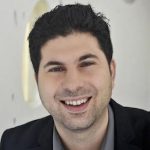Scott Barry Kaufman is a cognitive psychologist at the University of Pennsylvania, the scientific director of The Imagination Institute, and the author of Ungifted and Wired to Create. He recently hosted Alain de Botton, author of The Course of Love and founder of The School of Life, on The Psychology Podcast for a conversation on love, sex, religion, and why we should be more systematic in our search for happiness.
This conversation has been edited and condensed. To listen to the full conversation, click here.
Scott: The topics you study are about as striking to the core of human existence as possible. You pick the grandest questions and give people insight into them.
Alain: We’re all short of time, I’m a practical guy, and I want the questions that I look at to have real-world applications. I’m trying to understand myself, the people around me, the world around me, and it tends to be a problem that I want to try to solve: why is this thing so painful, so confusing, so dangerously vague?
Even though I deal with a lot of material that academics deal with, my emotional motivations are entirely different. I’m putting myself, humanity, and the planet on the couch, and I’m out for answers. That explains the way in which I go about my work.
Scott: What were you like as a kid? Did you sit on your bed at age 10 and think about death, religion?
Alain: No, not all. What I did was tidy things up. I had a huge imagination and was always building worlds out of Lego. I loved lining up the trees in precise symmetry and writing books where everything was neatly laid out. For me, it was a way of controlling anxiety. It grew out of that, that I became interested in ideas and I saw the life of the mind as the ultimate way of arranging trees in a neat row.
“I think you can divide humanity by what people do with their anxiety. Do you take it on the stage? Do you go jogging with it? Do you get drunk with it?”
I think you can divide humanity by what people do with their anxiety. After all, we all carry a lot of anxiety with us. Do you take it on the stage? Do you go jogging with it? Do you get drunk with it? Do you sing it out? Mastering things intellectually is my way of dealing with anxiety. It’s not coming from any particularly noble or pure place, it’s a survival strategy.
Scott: Before we get to things like sex and religion, I would like to start with love, [the subject of] your most recent book. I’m a psychologist, I wrote a book on the science of mating, and I thought I understood the science of love. How can your writing have given me so many more insights than I’ve gotten from reading a hundred peer-reviewed journal articles?
Trending: How to Transform Daily Habits into Life-Changing Rituals
Alain: Your job is much harder than mine, because I can have theories and hypotheses and I don’t need to test them stringently. I just need to float them. The ultimate approval is going to be whether they ring a bell with the reader, but we don’t have to do peer-reviewed tests. In a way, philosophers, writers, and essayists have this freedom to run ahead of science. I like the view that, essentially, science always catches up, because of the burden of proof.
I’m sure this has happened to you: you’ll read a paper by a psychologist on an aspect of love and you’ll think, “I knew that already.” To which the answer is, “Of course it felt true already, but the point of the experiment was to properly prove it.” I don’t need to do that. I can use fly-by-night techniques. I can use myself as my first and only test case. That’s a kind of freedom, the irresponsibility of the writer next to the scientist, which is, from where you’re standing, I can imagine both liberating and a bit maddening.
Scott: This idea that science catches up with what we have known in literature, poetry, and philosophy for thousands of years—who are scientists to think that we’ll ascertain the truth in one generation? Maybe we need to be more humble, as scientists, when we read poetry or great literature. What really tugs at my heartstrings when I read the story of the couple that forms the main narrative of your book is just how relatable [it is]. It’s like you’ve identified this template in our DNA that is destined to unfold. But when we’re in it, we don’t have the perspective to see it that way.
“As a word, ‘seduction’ is under suspicion, like you would only ever try to seduce with a falsehood. But you can also seduce with the truth.”
Alain: It’s not just what you say, it’s how you say it. I was always struck by the way there were great truths in a lot of academic books, but they weren’t hitting home because of the way they were expressed. That’s seen as an incidental issue by most scientists, even by many scholars in the humanities. The line is, “It doesn’t matter how you’re putting it down, so long as the idea is solid.” Of course, the audience is emotional and is responding with their senses. You’ve got to make sure not just that what you’re saying is correct, but that it’s delivered in a form which will hit home and seduce. As a word, “seduction” is under suspicion, like you would only ever try to seduce with a falsehood. But you can also seduce with the truth.
This book, I could’ve written it as a psychological treatise. I could’ve written it as an essay. It seemed important to write it as a novel so that it could have an emotional impact on the reader. As a writer, I’m asking, “What’s the book for, what’s it trying to do?” I’m in the game of trying to make the ordinary reader think and feel.
Scott: Jonah Lehrer wrote a book recently that was supposed to be the latest scientific summary of love, but the major criticism was that it made love dry.
Alain: There is a particular danger of sounding dry around love. Because moments of love are moments when we encounter our own irrationality most intensely, there can be something grating about a 30,000 foot view of the dynamics of the heart that doesn’t acknowledge that this is a folly that befalls us all. If you allow yourself, as the creator, to admit that you’re crazy along with everybody else, it can create a very useful feeling of identification.
Scott: That’s a very clear thing I got from your book: we’re all crazy. Love is picking the best of the “most suffering” options.
Alain: Yes. When I was younger, I’d see lots of relationship problems, but there was a lot of hope that it would just take time to sort itself out. The generation of one’s parents, they were crazy, but they were old. We were the modern people, and so what we needed to do was find the right person. As soon as we found the right person, things would fall into place. Like every generation, what you discover is it’s a little bit more complicated. The conclusion is that there doesn’t seem to be anyone having a normal relationship.
We’ve got this idea of what a normal relationship is: mutual respect, satisfying sex life, great passion, forgiveness. We have it in our minds, yet hunt for it in vain. That has to force a reflection on our hopes. I’ve come to the conclusion that everyone is unbalanced in one way or another.
“The issue isn’t to try and aim for perfection but try and understand imperfection, and within a couple, explain it to one another in a way that is comprehensible, is not offensive, and comes early enough in the relationship as not to cause lasting damage.”
We’ve all been navigating our emotional lives with a lot of baggage. The issue isn’t to try and aim for perfection but try and understand imperfection, and within a couple, explain it to one another in a way that is comprehensible, is not offensive, and comes early enough in the relationship as not to cause lasting damage. Human beings can forgive each other a huge amount so long as it’s explained in a certain way. If you arrive on a date and say, “I’m perfect, and I hope you’re perfect, too,” you’ll be in for trouble. If two people say, “I’m kind of crazy, and you’re kind of crazy, too. We’ll take that as a given. In what way are you crazy?” That’s an excellent starting point for a more realistic relationship.
Scott: You talk about how intimacy really comes: a linear correlation with how much you feel like you’re fully understood by the other person, or accepted.
Alain: That’s right. The problem is that we’re so hard on the other person’s bad behavior. What we call bad behavior is usually a kind of trauma, but both parties seem so ungenerous towards each other’s frailties that what could be a journey of growth becomes stuck in a cycle of complaints. It’s heartbreaking because so often arguments between couples are desperate attempts by two people to teach each other things about each other. But the way in which the lesson is delivered is so hysterical that you end up in cycles of nagging on one part, shirking on the other.
Trending: 5 Reasons Life Gets Better After Your 40s
Scott: You also make this interesting argument about sex, saying we’re thinking about it in the wrong way.
Alain: Freud taught us to think that a lot of things that seem innocent were, in fact, sexual, that the sex motive was everywhere, and that frightened a lot of people. I’m making almost the opposite claim, which is that a lot of sex looks like it’s about sex, but it’s not. It’s about everything else that we care about. For example, kissing is not that fun when looked at purely sensorily. It’s the idea that somebody has allowed us into the most private zone, and it’s an idea of acceptance. Take the idea of being able to be rough with a lover. It has to do with trust. All of these things deliver psychological pleasures via a physical medium.
Scott: What you’re describing is left out of a lot of the evolutionary psychology accounts of human mating. Although, David Buss did this interesting paper where he outlines over a hundred reasons why humans have sex. There is variability that you don’t see in other animals, because of the psychological dimension. You do talk about pornography in your book. I heard a rumor yesterday that you are creating a pornography site. Is that correct?
Alain: The School of Life, yes, did a pornography site called pornastherapy.com. We run a psychotherapy division at The School of Life and started to see people coming through where pornography was an issue in a couple, or an individual addiction. What do you do about that? One view is pornography’s fine, there’s absolutely no problem with it. The other view is it’s terrible: ban it, block it, censor it. Neither impulse seemed great.
Our feeling was the things that are wrong with pornography is that pornography excites the sexual impulse in ways that are unhelpful to the rest of life. It disconnects sex from other responses, patterns of thinking, ways of looking at the world, that are important. It cuts it off from communing with another person with sensitivity. So we wanted to re-contextualize sexuality in pornography and make a slightly different kind of pornography.
We were trying to think of a better kind of pornography, to try to correct some of the problems that we see in existing pornography. Not to ban it or escape it, but to work with the impulse and train it in a more fruitful direction.
Scott: As a positive psychologist, I can say that’s a topic that has never really been studied scientifically, the extent to which porn can increase well-being.
Alain: It’s tricky, but of course it can. We know that it’s an enormous release from anxiety. Like anything that’s addictive, the root of the addiction is in the capacity to release anxiety. It can be so good at doing that that it then becomes a problem in itself, but it must have that role. Also, our relationships are burdened by emotional consequences, by feelings of responsibility, of duty, of guilt, and pornography can be an encounter with a guilt and responsibility-free moment of sexuality.
Given the fact that this is an enormous industry, probably 50% of the internet, it deserves ongoing serious thought.
Scott: From an intellectual perspective, it’s extremely interesting: porn as a cure for loneliness, seriousness, responsibility. These are topics that could get a lot more scientific attention than they currently do.
“We are not systematic enough in our search for happiness. We’re surprisingly slack in the way we go about it.”
Let’s move on to religion. You argue that we put up this bifurcated argument, that religion’s either all nonsense or it’s all not nonsense. You call this a “boring” debate.
Trending: 5 Simple Strategies for Persuading Anybody
Alain: It’s boring for me, and it ultimately doesn’t get to the root of the problem: where does the impulse to believe come from? I take it for granted that the whole thing’s not true, but it’s emotionally true. Long after we’ve discounted the idea that there is a father in the sky, I want to think about that longing for a father. This is why the debate within Atheism is so sterile, because Atheists will spend their time going, “There is no God, no angels.” Fine, there are no angels. Why did we invent angels, sacred days, feasts of atonement? Where does this stuff come from? Where’s it gone now in a secular culture?
Scott: Yeah, and what are the secular themes of religion that everyone would benefit from? We’re studying this topic in our lab, and what seems to be religion for secularists is awe.
Alain: It’s something that everybody can agree on without getting frightened of. It seems like a useful starting point.
Scott: You talk about the benefits of religion: building a sense of community, making relationships last, overcoming feelings of envy and inadequacy. Religion, sex, love: all these things are complicated and also conducive to wellbeing.
You have also written specifically about the architecture of happiness. What would be the best way to architect society so that these things which are taboo, that bring us pain, can also bring us the greatest joy?
Alain: We are not systematic enough in our search for happiness. We’re surprisingly slack in the way we go about it. Take our two leading impulses around love and work: we want fulfilling work and fulfilling relationships, but the way we go about trying to find fulfilling work and fulfilling relationships is incredibly haphazard. We don’t think systematically about our psyches, and therefore we get it wrong. I think that progress is all about trying to increase the amount of reliable data on which people are basing their big life decisions on.
It’s sort of heartbreaking, when you think about how alone people are with their romantic lives, their career choices. One of the things I’ve tried to do with my books and with The School of Life is to try and give a first port of call for the hurdles we’re going to hit in our lives.
Most of our mind is sunk in darkness and we need, as much as possible, to shine the light of reason. We also need modesty. This is where humor comes in. Humor is deeply important because it’s the most gracious acknowledgement we can make of our incapacity, of our flaws. A sincere and ambitious life is never going to be far from a joke because we can’t understand very much. There’s that old expression: “Man thinks, God laughs.” In other words, man’s thoughts are petty things when looked at from a sufficient height.



























